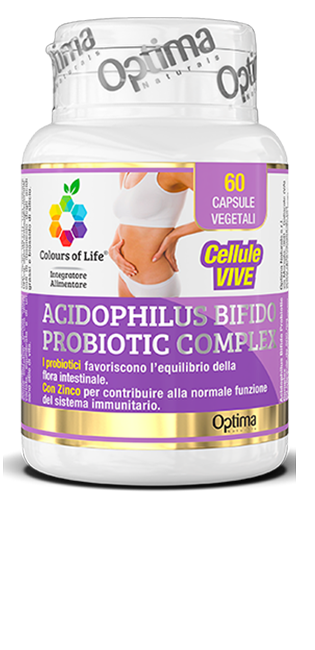Probiotics enhance the intestinal flora balance. With zinc support the regular function of the immune system.
Lactobacillus Acidophilus represents the main autochthonous probiotic colonizing the first intestinal tract, duodenum and jejunum. Several studies have demonstrated that Lactobacillus Acidophilus is characterized by the ability to inhibit bacterial and fungus growth, building up a useful defence system against infections caused by various bacteria and pathogen mycetes, in particular the Candida albincans.
During its metabolism, Lactobacillus Acidophilus produces lactic acid, thus acidifying the surrounding environment and creating conditions that strongly limit the growth of lactobacilli in addition to other bacteria and specifically E. coli, the growth of which stops at pH levels lower than 5. The lactobacillus bacteriostatic effect manifests itself also against Salmonella, bacteroides and clostridiums. It also supports the regular intestinal functions in case of sluggish bowels, diarrhoea and flatulence, and it is specifically recommended during and after antibiotic cures.
Bifidus Animalis is a gram-positive bacteria of the intestine, part of the probiotic family, consisting of live bacteria that, if ingested, offer great benefits to the organism, specifically for digestion. In short, when this bacterium reaches the digestive tract, it shows its potential and by crossing the stomach it survives gastric acids. At this point, along with other micro-organisms, it pushes “waste” toward the colon. The properties of Zinc are crucial for a balanced body growth, metabolism control and thus for body weight.
How to use
MAX DAILY DOSE: 2 TABLETSIndications for use
Ingredients
|
MEAN VALUE FOR MAXIMUM DAILY DOSE |
1 capsule (adolescents and children over 3 years) |
% NRV (*) FOR 1 cps |
2 capsules (adult) |
% NRV (*) FOR 2 cps |
|
inulin zinc gluconate of which zinc
Lactobacillus acidophilus (DSM 17742)
|
100 mg 47 mg 6.25 mg
10 mg equal to 1 billion
|
62.5%
|
200 mg 94 mg 12.5
20 mg equal to 2 billion
20 mg equal to 2 billion |
125%
|
*Nutrient reference Values



 Slim body
Slim body
 Intestinal functions and digestion
Intestinal functions and digestion
 Woman wellbeing and beauty
Woman wellbeing and beauty
 Immune system
Immune system
 Optima Naturals S.r.l. ® Via Sempione 124, 21029 Vergiate (VA)
Optima Naturals S.r.l. ® Via Sempione 124, 21029 Vergiate (VA)